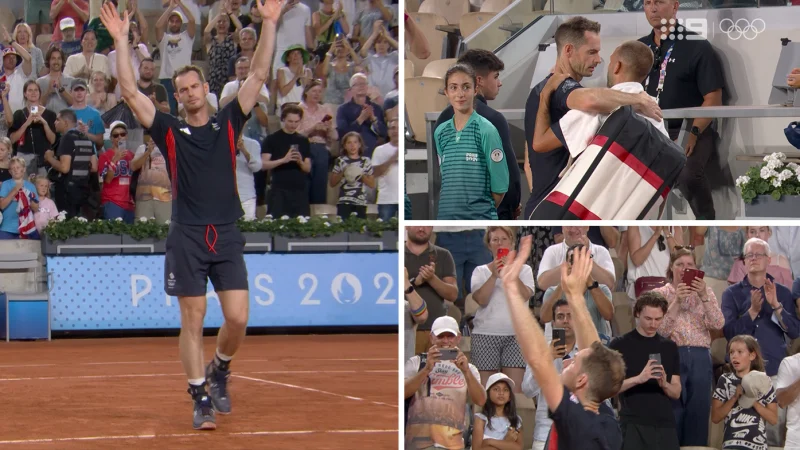Andy Murray cried. Dan Evans cried. Even BBC presenter Clare Balding shed tears. In the wake of Murray’s retirement following an illustrious career at the Paris 2024 Olympics, the outpouring of emotion was palpable.
At Roland Garros, the feelings resonated among Murray, his British teammates, and the many fans chanting his name. Balding’s reaction encapsulated the sentiments of a nation saying goodbye to one of its sporting legends. “Obviously, it was emotional because it’s the last time I will play a competitive match,” Murray shared while receiving applause from his mother, Judy.
“But I am genuinely happy right now. I’m happy with how it finished.”
Murray has never been one to shy away from emotion. His tears during the 2012 Wimbledon final against Roger Federer endeared him to many in the UK. “This isn’t going to be easy…” he had said, before the tears flowed freely.
He also wept after losing the Australian Open final to Federer in 2010, humorously commenting that he could “cry like Roger… it’s a shame I can’t play like him.” Following his Grand Slam victories, injuries brought more tears, especially during the 2018 Washington Open when he broke down under the strain of hip pain.
In January 2019, ahead of the Australian Open, Murray became emotional when announcing his potential retirement due to hip resurfacing surgery. Fast-forward five and a half years, and after an incredible comeback journey, Murray expressed contentment about ending his career on his terms.
“It’s been really hard. Physically, pain-wise, I feel bad,” he admitted. “While I can still perform at a competitive level, the pain and discomfort in my body are not good. I know it’s the right time to stop.”
Reflecting on the past few months, Murray noted the challenges he faced, including an ankle injury that hampered what he intended to be his final season and necessary back surgery that threatened his Wimbledon farewell.
Despite knowing he was unlikely to have a “perfect ending,” he expressed gratitude for the opportunity to compete in the Olympics: “At times in the last few years, that wasn’t a certainty. I feel lucky to have played here and created amazing memories.”
Murray means different things to various people: a sporting icon who elevated British tennis, an advocate for gender equality in sports, and an all-around decent guy with a sharp wit. After his press conference, he showcased his humorous side, joking on social media, “Never even liked tennis anyway,” and changing his bio from “I play tennis” to “I played tennis.”
Evans praised Murray’s character, saying, “He’s a class act and has been for years for British tennis and world tennis.”
Longtime friend and rival Novak Djokovic honored Murray as an “incredible competitor” and “one of the greatest warriors tennis has seen,” highlighting the impact of his fighting spirit on future generations.
Carlos Alcaraz, a rising star in the sport, expressed his admiration, stating it was a “pleasure” to share the court with Murray and congratulated him on a legendary career.
In addition to tributes from peers, public figures, including UK Prime Minister Keir Starmer, recognized Murray’s contributions to sport. Starmer tweeted, “Thanks Andy Murray for two decades of phenomenal entertainment and sportsmanship. A true British great.”
Immediately after Murray’s farewell, the Lawn Tennis Association announced the main court at Queen’s Club would be renamed the Andy Murray Arena, while plans for a significant facility in his hometown of Dunblane were also unveiled.
While there are conversations about a statue of Murray at Wimbledon, Evans humorously remarked he “could not stomach” the idea, asserting that Murray deserves to be recognized as a ‘sir.’
No matter what the future holds for Andy Murray, one thing is certain: British tennis—indeed British sport—will be poorer without him.
Credit: BBC Sport




